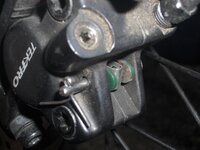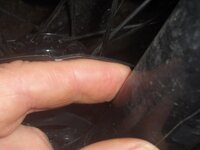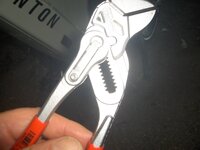spokewrench
Well-Known Member
- Region
- USA
I get up to 23 mph descending a hill near my house. I usually brake at the bottom to slow for the speed bump. Last week, when I applied the brakes, there was a clanking sound. It continued when I released and reapplied the brakes. I was afraid I might be incurring serious mechanical damage or might be thrown to the pavement.
It went away within seconds. I checked the bike and found no explanation. In the following days it happened at that spot several more times. I didn’t know which wheel it was coming from or if it was coming from a wheel. It continued whether or not I was braking, whether or not the motor was on, and whether or not I was pedaling. Generally it clanked once per wheel revolution but could happen more than once.
The last time, when I reapplied the brake, it changed from a clanking to a brushing sound that I recognized. It happens when a pad leaves a footprint after you brake to a complete stop with a hot disk. In this case, it happened with no stop.
Maybe a thicker deposit of pad material on the disc could clank and do so even with the brake released. As the watts of heat on the pad surface vary as the product of force and speed, the surface would tend more to get hot and soft at 23 mph than at lower speeds. I hadn’t felt any lurching or lever pulsing.
I checked the derailleur adjustment. I took both wheels off to better check discs and calipers and make sure all 72 spokes rang.
I reassembled the bike and tried what I should have done several days earlier: applying one brake at a time. At normal speeds, each was quiet. On the hill, I heard a faint ticking, like a mechanical wrist watch, from the front brake. If a tiny spot of pad material on the disc could cause ticking, a bigger spot might cause clanking.
Before the trouble started, I’d left the bike in the carport for a couple of days without riding it. During the night, it would cool nearly to the dew point. If I didn’t ride during the day, there would be no warming to dry it out. I think the pads had absorbed enough moisture from the air that when I braked at 23 mph, the heat could instantly cause a little lump to stick to the disc. When my clevis pins arrive, it should be easier to remove pads to check for pitting.
In 1 minute on low, my heat gun can raise the temperature of the outboard side of a caliper by 70 F. The inboard side gets almost as hot. I heated the caliper several times and have had no more trouble. I’ll keep my heat gun in the garage. At times when pads could be damp, a minute or two per caliper could help the pads.
It went away within seconds. I checked the bike and found no explanation. In the following days it happened at that spot several more times. I didn’t know which wheel it was coming from or if it was coming from a wheel. It continued whether or not I was braking, whether or not the motor was on, and whether or not I was pedaling. Generally it clanked once per wheel revolution but could happen more than once.
The last time, when I reapplied the brake, it changed from a clanking to a brushing sound that I recognized. It happens when a pad leaves a footprint after you brake to a complete stop with a hot disk. In this case, it happened with no stop.
Maybe a thicker deposit of pad material on the disc could clank and do so even with the brake released. As the watts of heat on the pad surface vary as the product of force and speed, the surface would tend more to get hot and soft at 23 mph than at lower speeds. I hadn’t felt any lurching or lever pulsing.
I checked the derailleur adjustment. I took both wheels off to better check discs and calipers and make sure all 72 spokes rang.
I reassembled the bike and tried what I should have done several days earlier: applying one brake at a time. At normal speeds, each was quiet. On the hill, I heard a faint ticking, like a mechanical wrist watch, from the front brake. If a tiny spot of pad material on the disc could cause ticking, a bigger spot might cause clanking.
Before the trouble started, I’d left the bike in the carport for a couple of days without riding it. During the night, it would cool nearly to the dew point. If I didn’t ride during the day, there would be no warming to dry it out. I think the pads had absorbed enough moisture from the air that when I braked at 23 mph, the heat could instantly cause a little lump to stick to the disc. When my clevis pins arrive, it should be easier to remove pads to check for pitting.
In 1 minute on low, my heat gun can raise the temperature of the outboard side of a caliper by 70 F. The inboard side gets almost as hot. I heated the caliper several times and have had no more trouble. I’ll keep my heat gun in the garage. At times when pads could be damp, a minute or two per caliper could help the pads.




